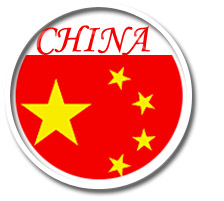Tibetan, Uighur groups decry China's "tyrannical rule"
 Beijing - Exile groups from China's Tibetan and Uighur minorities greeted Thursday's 60th anniversary of the People's Republic by criticizing the Communist Party's "tyrannical rule" while rights activists alleged "drastic repressive measures" before the anniversary.
Beijing - Exile groups from China's Tibetan and Uighur minorities greeted Thursday's 60th anniversary of the People's Republic by criticizing the Communist Party's "tyrannical rule" while rights activists alleged "drastic repressive measures" before the anniversary.
"Despite much change and progress in China, the people of China do not live under a democratically elected government, nor a government who acts independently of the Chinese Communist Party," a Britain-based coalition of Chinese, Uighur and Tibetan groups said in a statement.
"As a survivor of the Tiananmen Massacre, I am very proud of being a member of the coalition to manifest our resistance against the tyrannical rule of the Chinese Communist Party over the past 60 years," the statement quoted exiled dissident Shao Jiang as saying.
Shao was a student organizer of China's 1989 democracy protests, which ended with a military crackdown around Beijing's Tiananmen Square.
In the same statement, Karma Chura-Tsang, director of the group Tibetan Youth UK, urged the international community to "encourage China to become a democratic state and give freedom to the Chinese, Uighur and Tibetan peoples."
The Munich-based World Uighur Congress issued a separate statement saying the Communist Party's "brutal dictatorship" had "threatened the very existence of the Uighur people."
Uighurs in China's far-western Xinjiang region had "endured human rights abuses such as arbitrary detention and imprisonment, religious repression, and economic and educational discrimination," the World Uighur Congress said.
The Washington-based International Campaign for Tibet and London-based Free Tibet both criticized China's long-term policies and its "intense security and control measures."
"No amount of razzmatazz can disguise the fact that today's so-called celebrations are anything more than an empty charade," Free Tibet spokesman Matt Whitticase said.
"The 60th birthday celebrations in Beijing look extremely hollow when China has been obliged to put almost half of its territory in Tibet and Xinjiang under tight military lockdown," Whitticase said.
Mary Beth Markey, the International Campaign for Tibet's vice president, said the Communist Party had brought "revolution to China but occupation and oppression to Tibet."
"The Chinese authorities understand this distinction, and that is why security and control measures, not parades, are everywhere throughout Tibet today," Markey said.
The government suspended foreign tourism to the Tibet Autonomous Region over the anniversary, tour operators said, after serious unrest in many Tibetan areas of China last year.
It also tightened its control over internet access, blocking more websites than usual and most proxy servers.
"The Electronic Great Wall has never been as consolidated as it is now on the eve of the October 1 anniversary," Paris-based Reporters Without Borders said Tuesday.
The Hong Kong-based China Human Rights Defenders said the government had "implemented a number of drastic repressive measures" in recent weeks.
"Dozens of activists and dissidents have been detained, threatened, monitored, forced to leave the capital or kidnapped ahead of the anniversary," the group said.
"Petitioners in the capital have been rounded up and forced to return home, and those who attempt or are suspected of attempting to travel to Beijing to petition have been detained and threatened," it said.
US-based Human Rights in China also said Chinese authorities had used "various means to silence and restrict the activities of rights defenders, activists and writers" in the run-up to the anniversary.
It said it documented at least two dozen cases of sentencing, detention, house arrest or disappearance of dissidents last month.
Thursday's anniversary also saw protests by Tibetan exiles in India and Nepal.
Twenty-one Tibetans were arrested in New Delhi after trying to scale a wall around the Chinese embassy. In Kathmandu, police arrested 40 Tibetans attempting to march to the Chinese embassy's consular section.
In Hong Kong, about 600 people marked China's 60th National Day by taking part in a march demanding more human rights and greater press freedom in the world's most populous nation. (dpa)